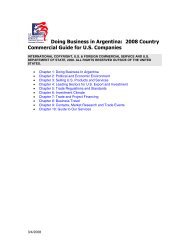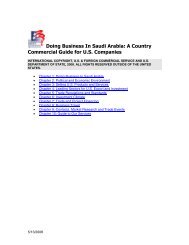Doing Business In (Insert Country Name Here) - BNA
Doing Business In (Insert Country Name Here) - BNA
Doing Business In (Insert Country Name Here) - BNA
Create successful ePaper yourself
Turn your PDF publications into a flip-book with our unique Google optimized e-Paper software.
Talks between employers and unions on revising labor contracts to make hiring and<br />
firing easier resulted in agreement on a number of points in early 2008. The government<br />
had threatened to introduce a tougher draft bill in Parliament if the talks had broken<br />
down. The agreed-upon measures will have to be approved by Parliament.<br />
The President' proposal to streamline assistance to job-seekers by merging France's<br />
national job placement and unemployment agencies is currently before Parliament, with<br />
the government hoping that the bill will be enacted before the March 2008 municipal<br />
elections.<br />
At the end of 2006, France adopted an employees’ shareholding law (“Loi sur la<br />
Participation”), which involves some changes in the labor code. The law encourages the<br />
purchase of shares by employees, the development employees’ investment/retirement<br />
savings accounts, and better representation of employees as shareholders. Employees<br />
in large companies who are laid off for economic reasons may benefit from “mobility<br />
leave” which involves training, short-term contracts, or transfer to another company<br />
within a pole of competitiveness. A new “transport allowance” will benefit employees<br />
who commute using public or private transportation. [http://www.legifrance.gouv.fr] –<br />
search the 31 December 2006 French Official Journal – law 2006-1770 of 30 December<br />
2006).<br />
Other labor standards are contained in collective agreements, which are usually<br />
negotiated by sector on a national or regional basis by the various trade union<br />
federations and employers' associations. French absenteeism is modest by European<br />
standards, and in the private sector peaceful labor relations generally prevail.<br />
While the rate of unionization in France has steadily declined to a little more than half<br />
that of the United States, French labor law provides an extensive institutional role for<br />
employee representatives and for organized labor.<br />
- <strong>In</strong> companies with more than 10 employees, employee delegates are elected for a oneyear<br />
term. They are authorized to present individual or collective claims and grievances<br />
relating to working conditions, to inform government labor inspectors of any complaints<br />
under the labor law, and to concur with management in any reorganization of the<br />
workweek. Management is required to meet with employee delegates at least monthly.<br />
- A company with more than 50 employees must have a joint management/employee<br />
enterprise committee, to which employee representatives are elected. The committee<br />
must be consulted for all major corporate decisions, but has no veto. The enterprise<br />
committee must be provided with the same information that is made available to<br />
shareholders. It is funded by the company at a rate equal to at least 0.2 percent of the<br />
firm's payroll, and uses this money to finance social and cultural activities for the benefit<br />
of employees.<br />
- Workers also hold most slots on occupational health and safety committees, which are<br />
mandatory in medium and large size companies. Labor tribunals (playing a role largely<br />
equivalent to the NLRB in resolving labor disputes) are comprised of equal numbers of<br />
union and employer representatives. Appeals are possible to the level of the “Cour de<br />
Cassation,” one of France's high courts.<br />
2/15/2008 <strong>Country</strong> Commercial Guide for France 117<br />
INTERNATIONAL COPYRIGHT, U.S. & FOREIGN COMMERCIAL SERVICE AND U.S. DEPARTMENT OF STATE,<br />
© 2007. ALL RIGHTS RESERVED OUTSIDE OF THE UNITED STATES.












